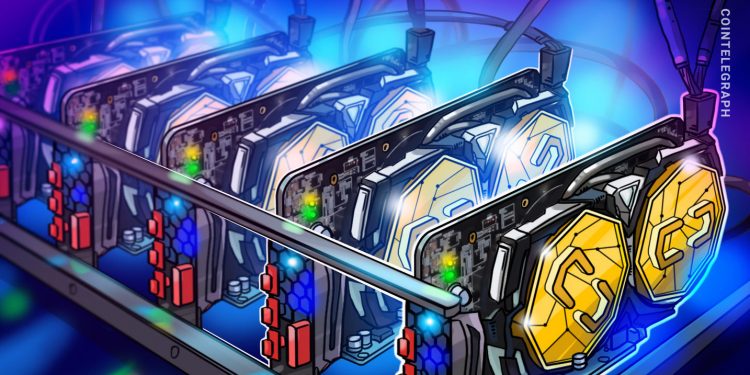In late April, over a hundred people gathered near the Texas Capitol building to protest.
Các cuộc biểu tình hòa bình ở Hoa Kỳ không phải là hiếm, nhưng điều làm cho điều này độc đáo là những người tham gia của nó được tập hợp để ủng hộ quyền sở hữu và sử dụng tiền điện tử.
Vị trí này cũng khó hiểu, vì Nhà nước Lone Star đã được trình bày như một trung tâm tiềm năng cho ngành công nghiệp mật mã ở Hoa Kỳ, với các luật tiểu bang và liên bang khác nhau tạo ra một cảnh quan quy định không đồng đều.
‘Digital Freedom rally’ to oppose Senate Bill 1751 in Texas State Capitol #Bitcoin $BTC pic.twitter.com/lwAzAbSnY0
— Cointelegraph (@Cointelegraph) April 25, 2023
Và như vậy, những người đam mê mật mã tụ tập lại ở Austin để phản đối Thượng viện Bill 1751, điều này sẽ loại bỏ các nhà khai thác tiền điện tử của một số ưu đãi thuế hiện có. Dự luật đã được thông qua tại Thượng viện tiểu bang và đã tiến hành hạ viện Texas.
Texas doesn’t fit the binary narrative of crawling into a “crypto-hostile” mode. While its legislators want to strip crypto miners of tax incentives, they almost simultaneously vote for the right of individuals to possess crypto be included in the state’s Bill of Rights.
Làm thế nào để các động thái lập pháp đặc biệt như vậy đến, và nó có ý nghĩa gì đối với ngành công nghiệp?
Con đường điều chỉnh của người tiên phong
Gần 10 năm trước, Texas trở thành tiểu bang đầu tiên giải quyết quy định Bitcoin (BTC) khi Ủy viên Ngân hàng Texas đưa ra một bản ghi nhớ tuyên bố rằng tiền điện tử gốc “được xem tốt nhất như một khoản đầu tư đầu cơ”, không phải là tiền.
Đó là tin tốt cho những người áp dụng sớm, vì họ đã được tha khỏi sự quan tâm của các nhà quản lý. Từ đó trở đi, Texas bắt đầu thu hút các doanh nghiệp mật mã địa phương và toàn cầu.
In 2021, the Texas Department of Banking declared that local banks are allowed to store cryptocurrencies for their clients. A month later, the state legislature amended the local Uniform Commercial Code to recognize cryptocurrencies under commercial law. Another bill established a blockchain working group in the state.
Tuy nhiên, khi Texas đưa nó vào danh sách năm bang hàng đầu của Cointelegraph về tiền điện tử, đó là do các điều kiện khai thác mật mã độc đáo của nó hơn là những nỗ lực quy định của nó.
Energy prices for industrial clients were among the lowest in the country — or in the opinion of mining company Layer1 Technologies then CEO Alex Liegl — in the world.
Sau khi Trung Quốc đàn áp khai thác mỏ tiền điện tử vào năm 2021, nhà nước Mỹ đã thưởng thức sự quan tâm của các thợ mỏ lớn trên toàn thế giới. Thống đốc Greg Abbot bày tỏ sự phấn khích của mình về việc Texas trở thành “nhà lãnh đạo mật mã hóa” tiếp theo, với các cộng đồng địa phương chào đón các doanh nghiệp mới, mở lại không gian công nghiệp và thuê người ở
Xu hướng này tiếp tục vào năm 2022, với những kẻ khai thác mỏ như Riot Blockchain di chuyển các giàn khoan đến Texas. Ngay cả những đợt sóng nhiệt kỷ lục trong mùa hè và những cơn bão mùa đông chết người cũng không làm tắt các nhà khai thác mỏ, vốn chấp nhận một số giai đoạn
The Texas Comptroller’s office even tried to clarify that cryptocurrency mining facilities “do not place big electrical demands on the grid.” The same words have been repeated by Senator Ted Cruz, who expressed his hope to make Texas an “oasis for Bitcoin.”
Hot season for lawmaking initiatives
Tuy nhiên, mặc dù có những lời đề nghị thân thiện với ngành công nghiệp mật mã, các nhà chức trách Texas chưa bao giờ tránh khỏi hành động thực thi.
Cơ quan quản lý tài chính chính của tiểu bang, Ban Chứng khoán Bang Texas (TSSB), có một lịch sử tương tác lâu dài với thị trường.
It accused Bitconnect of illegal securities trading, along with 31 other companies to follow, and pushed Arise Bank — a self-described “first ever decentralized banking platform” — out of the state for using the word “bank.”
In 2022, the TSSB actively participated in enforcement action against collapsed crypto exchange FTX, pushing charges against co-founder Sam Bankman-Fried, scrutinizing “finfluencers” who advertised the platform, and objecting to the potential sale of Voyager Digital to FTX even before the latter’s bankruptcy.
Texas also had its fair share of controversy in attempts to regulate crypto. In 2019, local lawmakers introduced a bill requiring users to identify themselves when using digital currencies. However, the bill never made it past the first reading.
But only in 2023 did the real, even anomalous, appetite for regulation arise among Texan lawmakers.
House Bill 1666, which was introduced in January by a group of lawmakers led by Representative Giovanni Capriglione, proposed to amend Section 160 of the Texas Finance Code, restricting large digital asset providers — with 500+ customers and at least $10 million of funds — from comingling the customer funds with any other type of operational capital. The bill reached Senate approval in three and a half months and was sent to the Governor’s office in May.
In early March, Representative Cody Harris introduced a resolution urging fellow lawmakers to “express support for protecting individuals who code or develop on the Bitcoin network.”
While the resolution doesn’t have any concrete effects or legal power, it provides a picture of the sentiment among certain lawmakers.
Texas lawmakers also introduced a bill to create a state-based digital currency backed by gold, the idea being that once a person purchases a certain amount of the digital currency, the comptroller would use the money received to buy an equivalent amount of gold.
The mining bill
Senate Bill 1751 started its legislative journey in early March. In a top-down fashion, it passed through the Senate and will now be considered by the House of Representatives State Affairs Committee before heading to the first vote in the lower chamber.
Dramatically presented by some in the crypto community as an “anti-Bitcoin bill” or a “hammer” in the hands of lawmakers, the initiative, in fact, only revokes some artificial incentives, which the mining companies have been enjoying alongside some of the lowest energy prices in the country.
Theo dự luật, từ tháng 9 năm 2023, tỷ lệ của các cơ sở khai thác mỏ crypto trong tổng nhu cầu năng lượng nên được giới hạn ở mức 10%. Tuy nhiên, nó chỉ áp dụng trong khuôn khổ của một chương trình nhà nước bù đắp giảm tải giữa các sự kiện cực đoan như sóng nhiệt hoặc bão mùa đông
Điều đó có nghĩa là các thợ mỏ, công ty hiện đang bán năng lượng cho lưới điện với mức phí bảo hiểm khi cần nó, sẽ không thể làm như vậy trong bối cảnh nhu cầu năng lượng ngày càng tăng của ngành công nghiệp.
Also, some mining companies would stop receiving a reduction in state taxes for participation in this program. One of the bill’s sponsors, Senator Lois Kolkhorst, was quite clear about the reasons behind the initiative:
“We’re trying to produce all this new power. We’re going to have a lot of this new power taken up by virtual currency mining. And then we’re going to pay them to go off the grid at different times, which I believe is a part of their business model.”
What’s next?
Người đồng sáng lập của dự án Web3-Ecosapiens, Nihar Neelakanti, không chắc chắn rằng dự luật khai thác mỏ “dường như chống Bitcoin” sẽ là “tất cả những bất lợi” đối với hầu hết các thợ mỏ trong tiểu bang “cho rằng họ có thể sẽ rơi xuống dưới ngưỡng năng lượng được đặt ra trong dự luật,” ông nói với Cointelegraph.
However, Neelakanti’s observation might become outdated relatively soon. To believe the unnamed source from the Electric Reliability Council of Texas cited in an article by The Verge, crypto mining is set to add 27 gigawatts of demand to the grid by 2026.
Hiện nay, lưới điện Texas có thể cung cấp 92 gigawatt ở mức tối đa. Nếu nó không nâng cao năng lực của mình trong ba năm tới, khai thác mật mã có thể chiếm phần của sư tử trong sản xuất điện Texas, trong trường hợp đó, 10% nắp sẽ cắt giảm các thợ mỏ khỏi chương trình ưu đãi
Speaking to Cointelegraph, Fred Thiel, the CEO of the crypto mining company Marathon Digital Holdings, said that owners of peaker gas plants heavily backed Senate Bill 1751. They need electricity during peak demand and regard Bitcoin miners selling the energy back to the grid as competition. However, he is quite optimistic about the bill not becoming law:
“Nó sẽ có bất lợi cho ngành công nghiệp của chúng tôi, nhưng có vẻ như rõ ràng dự luật này có khả năng sẽ không vượt qua trong nhà nước.”
Thiel cũng nhấn mạnh áp lực ở cấp liên bang làm cho các tiểu bang khó áp dụng các chính sách ủng hộ Bitcoin.
Zachary Townsend, Giám đốc điều hành của nhà cung cấp bảo hiểm thân thiện với Bitcoin Trong khi đó, dường như đồng ý, nói với Cointelegraph rằng chính quyền liên bang đang có một cách tiếp cận cứng rắn đối với ngành công nghiệp ở cấp khu vực. Tuy nhiên, ông nhấn mạnh rằng vẫn có những tiến bộ ở cấp tiểu bang:
“There’s Wyoming and Tennessee, as well as blue-leaning states like Colorado. That might be something similar to how the marijuana debate has played out at the state level — you basically have had states crafting their own rules and regulations that, at times, were contradictory to federal rules and regulations.”
In the middle distance, the reciprocal process of federal pressure and local autonomy could converge both poles into some kind of middle ground. Until then, the wrangling will likely intensify at the state level. And Texas, in Townsend’s opinion, seems to be ground zero for this debate.

























